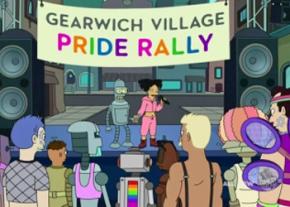Standing up for robosexuality
reviews Futurama, the sci-fi cartoon from The Simpsons creator Matt Groening--now back on the air after a seven-year absence.
WELCOME TO the world of tomorrowww! Again. That's right, meatbags, Futurama is back!
In case you've been hiding under a space rock, Futurama is Matt Groening's "other" show--the one he put his true nerd heart into. If it looks like a Simpson's knockoff to you, bite your eye, fellow Earthican. It's anything but. This is sweet, savory sci-fi at its most adventurous, presented in beautiful, Technicolor cartoon form.
The show centers on Fry, a pizza delivery boy accidentally cryogenically frozen in 1999, who wakes up in the year 3000, awestruck by the technological marvels, mutants and alien beings he encounters.
He falls in unrequited love with Leela, a smart, sassy cyclops. He becomes best friends with Bender, a thieving, smoking, drinking, belching robot. And he works alongside a motley crew of other characters at Planet Express--once again as a delivery boy, only this time on a spaceship.
Fox canceled Futurama in 2003 after rescheduling and pre-empting the show to death, but its creators never gave up trying to bring it back. Seven years and an abundance of DVDs and cable reruns later, the show finally was resurrected from the Fox dustbin with 26 new episodes, now showing on Comedy Central. With more opportunities than ever to bite Bender's shiny metal ass, the future couldn't be brighter.

The "new" Futurama is a little older thanks to Fox's neglect, a little wider thanks to HDTV, and a little edgier thanks to its new home on cable. New New York is as retro-futuristic and owl-infested as ever, complete with pneumatic pedestrian traffic tubes, suicide booths and a mind-numbing array of sci-fi and technology references. (Watch for the eyePhone and Twitcher in an Apple-skewering episode "Attack of the Killer App.")
As before, binary Easter eggs and math jokes abound. In fact, one of the writers developed a math theorem for an episode this season just to explain a plot twist.
SO IS it any good? Oh my, yes. Futurama won the Guinness World Record for "Current Most Critically Acclaimed Series" in 2010. But what really makes Futurama great is its relevance.
The show has tackled social issues since its very first episode--war, colonization, racism, sexism, environmentalism, corporate greed, addiction and more--with great humor and aplomb. And this season's episode defending robosexuality is no exception.
Good news, everyone! Gay marriage is commonplace in the year 3000. So what is the new taboo? Robosexuality, of course--sex between humans and robots, for those stuck in the last millennium.
The fourth episode of the season, "Proposition Infinity," takes on the same-sex marriage debate using the fight for robosexuality as stand-in. The title is a reference to Proposition 8, the law that took away our hard-won right to marry in California and is still a focal point in the fight for LGBT liberation.
The plot is fairly straightforward, as Futurama plots go. After two secondary characters, Amy and Kif, split because Kif isn't enough of a bad boy for Amy, Bender (the original bad-boy robot) and Amy hook up. Before long, they decide to get married, only to run up against society's prejudices.
Rev. Lionel Preacherbot speaks for the bigots when he hollers, "Robosexuality is an abomination!" It's hardly surprising that Preacherbot ends up exciting himself while trying to "cure" robots of their attraction to humans.
The story winds its way through jokes lampooning "don't ask, don't tell," Brokeback Mountain and even the "Gathering Storm" ad attacking gay marriage aired by the misnamed National Organization for Marriage.
Other goodies abound. Pro-robosexual-marriage protesters' signs read: "Stand up for equality!" Anti-robosexual marriage protesters' signs read: "Fall down and be unable to get up for traditional marriage!" A sight gag involving Hedonismbot and Hot Dog Stand Robot simply cannot be missed.
George Takei's head, voiced by the famously out Star Trek actor himself, hosts the debate on robosexual marriage that tips the tide in favor of legalization. And Hermes, everyone's favorite Jamaican Planet Express bureaucrat, ties this fight to another.
Hermes: Yeah, mon! You got to legalize it!
Amy: We're talking about robosexual marriage.
Hermes: We're talking about lots of stuff.
Although Star Trek took up issues of racial and gender inequality, it never showed LGBT beings in its universe. But many other shows--Torchwood, Buffy the Vampire Slayer and Caprica, to name a few--have begun to paint a future where LGBT equality is closer at hand.
"Proposition Infinity" takes us another step in the right direction, even if it is one frame at a time. As the giant-headed, angry, green newscaster Morbo cries out to his TV viewers at show's end: "What's next? Gay robosexual marriage?" One can only hope...


